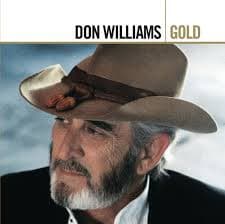
The Gentle Giant’s Farewell: Finding a Moment of Grace in the Shadow of Doom
There are some songs in the country music canon that possess an almost unbearable gravity, and a tune that explores a prisoner’s final walk is certainly one of them. While the song “Sing Me Back Home” is indelibly linked to its original author, the great Merle Haggard, for many of us who remember the quiet grace of the “Gentle Giant,” it’s the 2014 cover by Don Williams that resonates with a profound, final wistfulness. It’s the sound of a man who knows life’s journey is nearing its end, choosing to look back with a gaze of pure, unhurried reflection.
Don Williams’s rendition of “Sing Me Back Home” was released on his 2014 album, Reflections, which, fittingly, turned out to be his final studio record before his passing. The album itself peaked at number 17 on the US Top Country Albums chart and number 3 on the UK Country Albums chart, though Williams‘s take on this classic was not released as a charting single. By this stage in his illustrious career, the chart numbers mattered far less than the sheer quality and emotional weight of the recording. At the age of 75, Williams took the stark, raw edges of Haggard’s original prison narrative and smoothed them with his signature golden voice, transforming a tale of Outlaw Country grit into a deeply moving, melancholic ballad of peaceful surrender. It’s a testament to his musical maturity that he could reinterpret such a legendary piece and make it entirely his own.
The true narrative heartbeat of “Sing Me Back Home” belongs to Merle Haggard, who released the song as a single in November 1967, where it climbed to a monumental No. 1 on the Billboard Hot Country Singles chart. Haggard wrote the piece while serving time in San Quentin State Prison, where he drew inspiration from two fellow inmates: James “Rabbit” Kendrick, who was executed for killing a Highway Patrolman, and Caryl Chessman. The lyric describes a narrator who is one of the “good-bye crowd” watching a condemned prisoner being led down the hallway to his doom. The condemned man’s last request isn’t for a pardon or an escape, but for a final song from his “guitar playing friend”—a song that will “make my old memories come alive” and “take me away and turn back the years.” This final, poignant request is the very definition of the song’s meaning: a desperate yearning for the peace and innocence of a lost past, a momentary escape from the harsh, cold reality of the present before facing one’s ultimate fate.
For those of us who grew up with Don Williams‘s voice—a voice that earned him the nickname “The Gentle Giant”—this cover feels like a conversation with an old friend. Haggard delivered the song with the palpable tension of a man who had lived the story, with a sense of lingering danger and raw regret. But Williams… he sings it with a quiet acceptance. His rendition, placed at the tail end of his recording career, carries the beautiful, heavy weight of a life well-lived and fully accepted. When he sings that iconic line, the words don’t crackle with a convict’s desperation; they flow with the resigned, tranquil flow of a river nearing the sea.
His choice to cover this song in 2014 speaks volumes. It’s an act of respect for a legendary peer and a final statement on the great themes of his own career: simplicity, honesty, and the enduring importance of home and human connection. To hear his deep, rich baritone deliver the tale of a soul seeking comfort in the memory of a mama’s gospel song, just before the final curtain falls, is to be reminded that at the end of every path, all we truly crave is the simplicity of where we began. Don Williams took a powerful, tragic ballad and wrapped it in a blanket of peaceful farewell, making his version a truly touching final musical reflection.